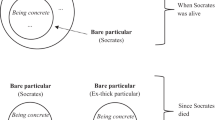Abstract
Sceptics about substantial disputes in ontology often argue that when two philosophers seem to disagree on a quantified claim, they are actually equivocating on the notion of existence that they are using. When temporal elements play a central role, as in the debate between presentists and eternalists, the hypothesis of an equivocation with respect to existence acquires more plausibility. However, the anti-sceptic can still argue that this hypothesis is unjustified.
Similar content being viewed by others
Notes
Beware of the terminological jungle. Temporal qualifications of this kind, that is, relational qualifications to times or temporal indexing (e.g. being-red-at-t) are usually, and rightly, classified as tenseless (Hawley 2001). However, when the explicit temporal modification concerns the copula (being-at-t), philosophers usually talk of ‘tensing the copula’ (Lewis 2001). The slippery talk of pseudo-tense as a tensed notion may be harmless in certain contexts (for instance if the focus is on the temporal modification and not on the implicit reference to the present), but here it is crucial to see that pseudo-tense is a tenseless notion. Note also that the taxonomy is not meant to be exhaustive. In particular, we are not ruling out a notion of tensed existence enriched with explicit reference to dates, which is considered fundamental by Tooley (1997 and 2003).
I take “(B) implies (A)” to be short for “for any x, the proposition that x exemplifies (B) implies the proposition that x exemplifies (A)”, and mutatis mutandis for the other claims of implication.
There is an issue as to what “reducible” means here. It is well known that it cannot mean that the notions are translatable one into the other (Prior 1959; Perry 1977), because we need tensed concepts in order to explain our ordinary behaviour. Roughly, what is meant by the B-theorist is that tensed notions stand only for relational tenseless facts (Mellor 1998; Oaklander 2004).
To sum up: for the eternalist, both (B) and (C) and (D) imply (A); for the presentist, (C) implies (A), but neither (D) nor (B) imply (A). What about the implication from (A) to (C)? Given that, according to the presentist, those entities that presently exist are all and only the entities that exist, it follows that (A) implies (C). However, the presentist should not take the entailment here to be a conceptual one, on pain of making the tenets of the eternalist a conceptual impossibility and hence an absurdity. Even if presentists maintain that their position is necessary, they should spell it out in terms of some metaphysical, rather than conceptual or analytical, necessity.
See Zimmermann 2005.
See Meyer 2005.
Note that if tensed sentences containing an ascription of simple existence can vary truth value over time, then also whether there is disagreement or not will vary over time. This seems right. Although the presentist and the eternalist now disagree about the truth value of (4), they would have not disagreed if they had been around in the Jurassic.
References
Callender C. (2011) “Time’s Ontic Voltage” in Adrian Bardon (ed.) The Future of Philosophy of Time, London & New York, Routledge.
Dorato, M. (2006) “The irrelevance of the presentist/eternalist debate for the ontology of Minkowski spacetime”, in D. Dieks (ed.), The Ontology of Spacetime, Elsevier: 93–109.
Hawley K. (2001) How Things Persist, Oxford, OUP
Lewis D. (2001) “Tensing the copula”, Mind, 111: 1–14
Mellor D.H. (1998) Real Time II, London & New York, Routledge
Meyer U. (2005) “The Presentist’s Dilemma”, Philosophical Studies, 122: 213–225
Oaklander N. (2004) The Ontology of Time, Amherst (New York), Prometheus Book
Perry J. (1977) “The Problem of the Essential Indexical”, Noûs 13:3–21
Prior A. N. (1959) “Thank Goodness That’s Over”, Philosophy, 34: 12–17
Savitt S.F. (2006) “Presentism and Eternalism in Perspective” in D. Dieks (ed.) The Ontology of Spacetime, Elsevier: 111–128
Sider T. (2011) Writing the Book of the World, Oxford, OUP
Tooley M. (1997) Time, Tense, and Causation, Oxford, OUP
Zimmermann D. (2005) “The A-Theory of Time, The B-Theory of Time, and ‘Taking Tense Seriously’”, Dialectica, 59,4: 401–45
Acknowledgments
For financial supports, thanks to the projects FFI2011-29560-C02-01 and FFI2011-25626 of the Spanish Ministerio de Ciencia e Innovacion (MICINN). For useful discussions on a previous draft, thanks to Bryan Pickel, Mauro Dorato, and Achille Varzi.
Author information
Authors and Affiliations
Corresponding author
About this article
Cite this article
Torrengo, G. Time and Simple Existence. Int Ontology Metaphysics 13, 125–130 (2012). https://doi.org/10.1007/s12133-012-0096-8
Published:
Issue Date:
DOI: https://doi.org/10.1007/s12133-012-0096-8



